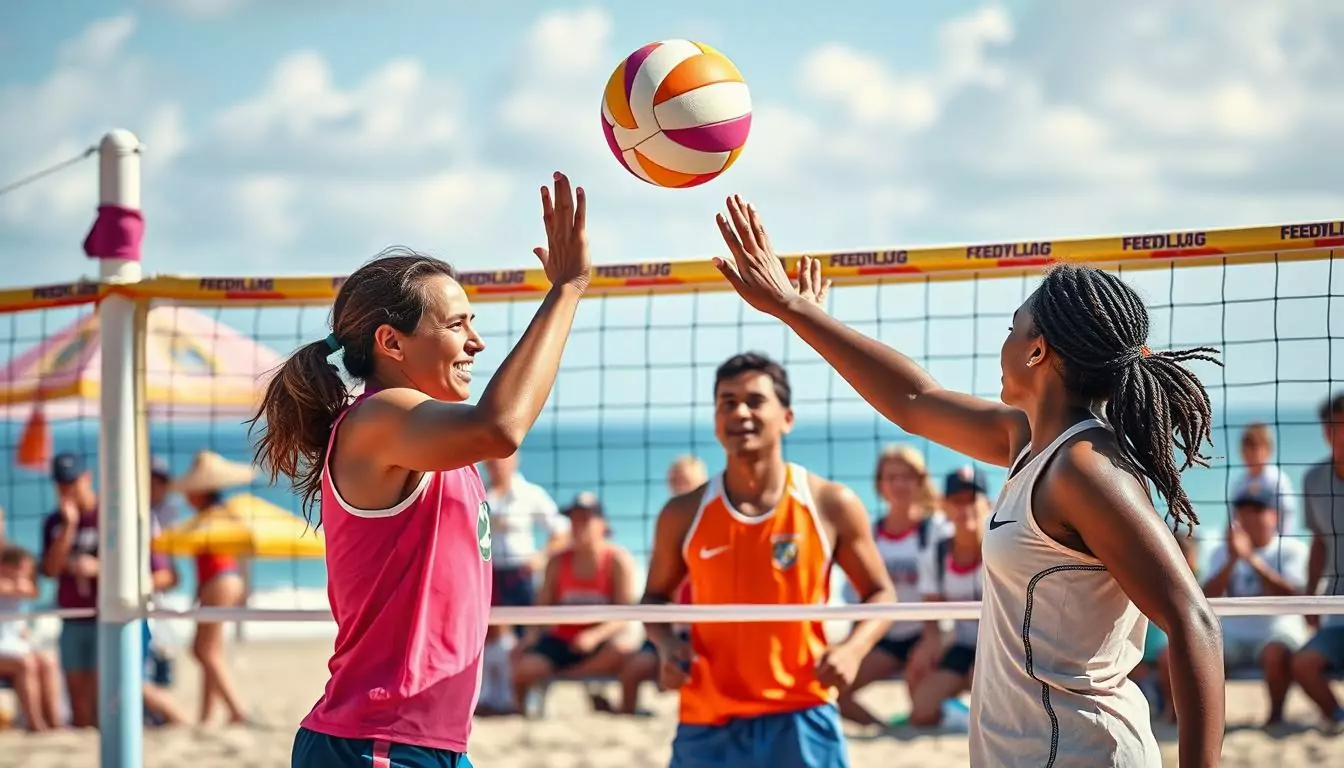When I walk onto the court to play volleyball I feel a sense of excitement. The ball striking onto the surface, the cheers of the crowd and the camaraderie of my team that’s the reason I am a fan of volleyball. However, there’s more to it beyond the excitement of playing. The importance of sportsmanship is equally important.
In a sport in which emotions are high, being mindful and positive is crucial. This isn’t just for enjoyment, but also for personal development. Basketball players gain valuable lessons in and off the court.
Key Takeaways
- Sportsmanship is about respect integrity, honesty, and teamwork when playing volleyball.
- A good sportsmanship can enhance the overall experience of players, coaches and the public.
- Respecting the opponent, adhering rules, and keeping an good attitude are the most important aspects of sportsmanship.
- The sport of sportsmanship promotes fair playing and respect for each other on the court of volleyball.
- Respecting sportsmanship values can result in personal growth and lifelong lessons for athletes.
Understanding Sportsmanship in Volleyball
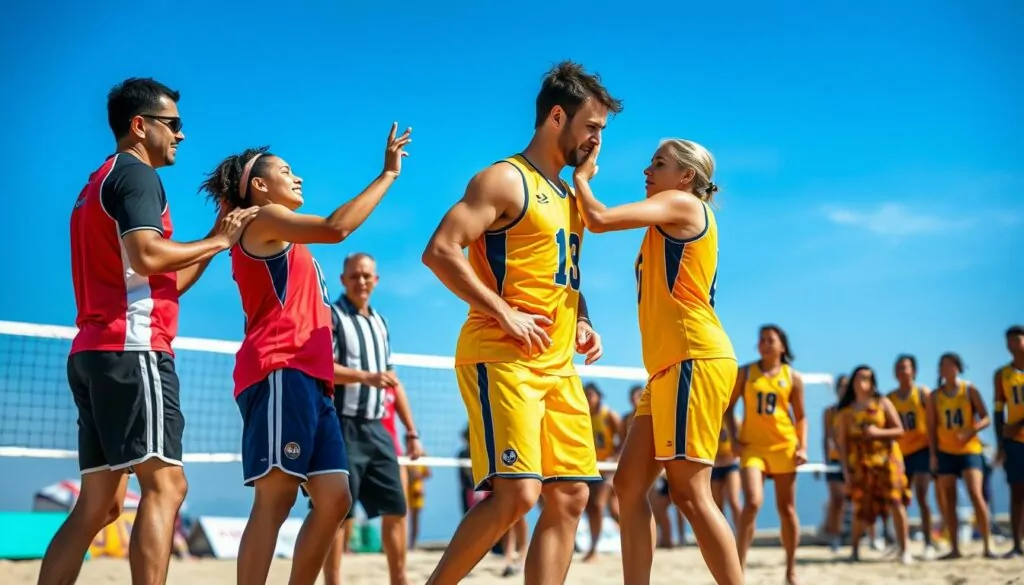
Volleyball is much more than an exercise in skills and strategies. It’s a sport that demands excellent sportsmanship from all players. This means respecting your opponents officials, players, as well as even the rules of play. Sportmanship that is good improves the quality of the game and improves team spirit and helps to promote fair game play.
What is Sportsmanship?
It is about being responsible and respectful in sports occasions. It includes things like honesty, fairness and respect for the game and its participants. In volleyball, this is crucial to keep the game fair and creating a sense the community among players.
Why is Sportsmanship Important?
The importance of sportsmanship in volleyball is for a variety of reasons. It helps athletes cooperate, communicate well and respect each other. It also encourages collaboration and encourages players to help each other during difficult moments. Respect and professionalism are an essential part of sportsmanship.
The Impact of Sportsmanship on Team Dynamics
A good sportsmanship attitude is a major factor in the dynamics of a volleyball team. It helps build friendship, trust and respect between players. It also helps players deal with losses and wins with ease. Through valuing respect for all involved, sportsmanship helps athletes develop into better individuals with honesty, integrity and humility.
“Sportsmanship is not just about winning or losing; it’s about respecting the game, your opponents, and your teammates. It’s a fundamental aspect of volleyball that can make or break a team’s success.” – Coach Emily, North Valley High School
In the end, sportsmanship in volleyball is vital and extends beyond the game. It fosters positive attitudes and strengthens the bonds of the team and builds a sense community. Through embracing sportsmanship, players improve their performance and become well-rounded people who embody the spirit of the game.
Key Principles of Sportsmanship
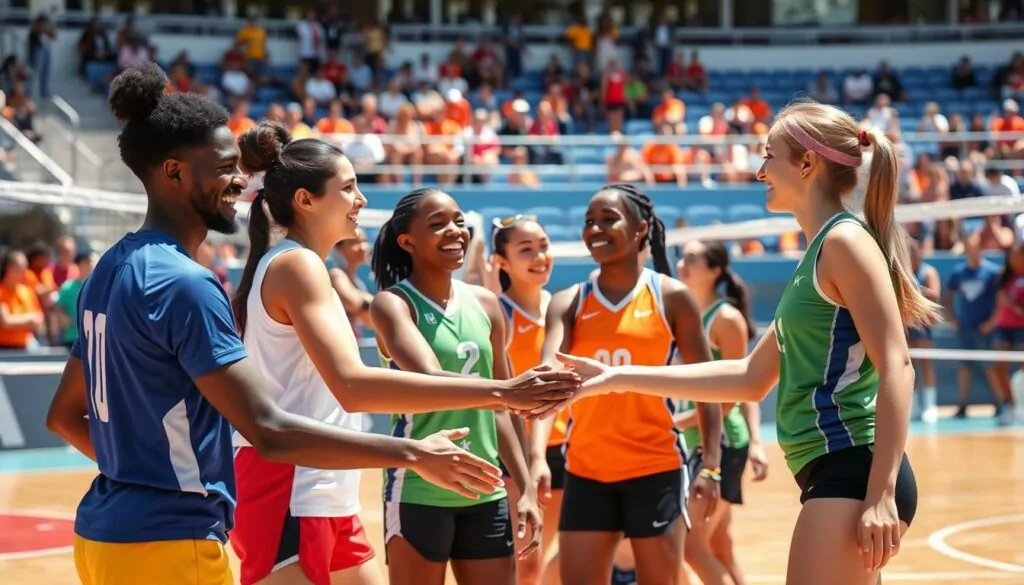
Volleyball is known for its teamwork and competitive spirit. It’s built on sportsmanship. Players must respect opponents, play fairly, and stay positive. This makes the game better and inspires future athletes.
Respect for Opponents
It’s easy to get caught up in trash talk during games. But, true sportsmanship means treating opponents with respect. We should not belittle our rivals, as they work hard just like us.
Fair Play and Ethics
Following the game’s rules is key to sportsmanship. We must be honest and transparent. Cheating undermines the game’s integrity and goes against fair play.
Positive Attitude and Encouragement
Being positive towards everyone on the court is important. We should encourage our teammates and opponents. This creates a supportive environment that motivates everyone to play their best.
Sportsmanship is more than rules; it’s a way of life. As volleyball players, we can set a good example. We inspire others to embrace the sport’s true spirit.
| Sportsmanship Behavior | Percentage Observed in Youth Sports |
|---|---|
| Winning without gloating | 78% |
| Losing gracefully | 65% |
| Adhering to rules and regulations | 82% |
| Encouraging participation for all players | 71% |
| Respecting referees’ decisions | 75% |
By following these sportsmanship principles, we can improve volleyball. Let’s respect our opponents, play fairly, and stay positive. This will inspire others to do the same.
Setting a Good Example
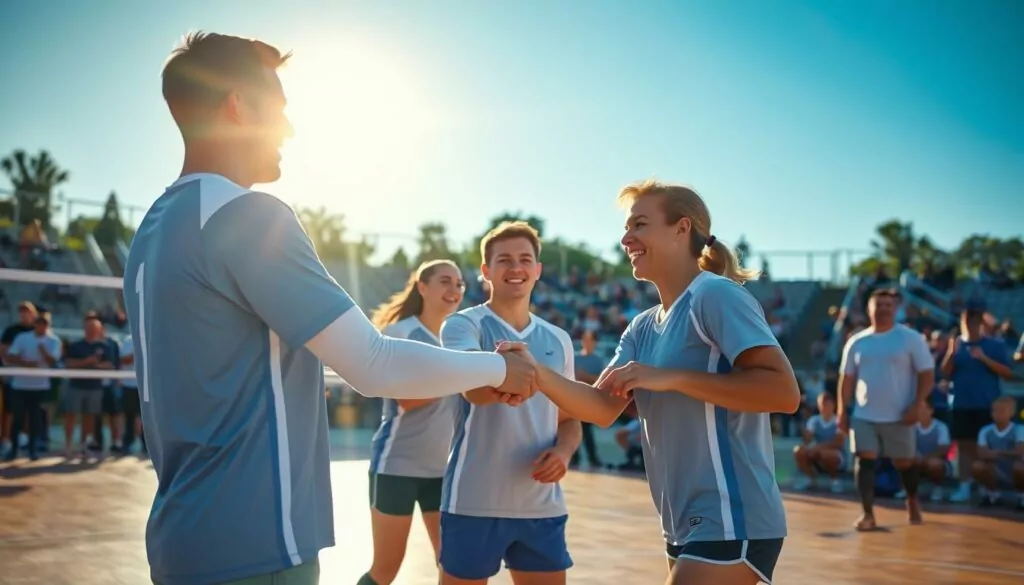
As athletes, we have a chance to be role models on the volleyball court. By showing sportsmanlike conduct and ethical behavior, we can build a respectful and honest culture. This goes beyond just playing the game.
Leading by Example on the Court
Leading by example is key to promoting good volleyball rules and sportsmanship. We should praise our opponents’ good plays and handle disagreements with officials calmly. Keeping our cool, even when the game is intense, is important.
Encouraging Positive Behavior in Teammates
We can also motivate our teammates to act with sportsmanship. By celebrating fair play and respect, we strengthen our team’s values. This makes the game more fun and sets us up for success in the future.
As athletes, we have a chance to make a positive impact on volleyball. By practicing good sportsmanship, we inspire others to do the same. Our actions can create a lasting legacy that goes beyond winning or losing.
| Sportsmanship Principles | Examples of Good Behavior |
|---|---|
| Respect for Opponents | Congratulating opponents on good plays, shaking hands after the game |
| Fair Play and Ethics | Abiding by the rules, accepting referee decisions, and playing with integrity |
| Positive Attitude and Encouragement | Cheering for teammates, giving helpful feedback, and staying calm |
“The final test of a champion is not victory, but the courage with which he accepts defeat.”
– Billy Bixby
By living these sportsmanship values, we improve our own game and inspire others. It’s a big responsibility, but our actions can have a big impact. We should take it seriously.
Communication and Respect
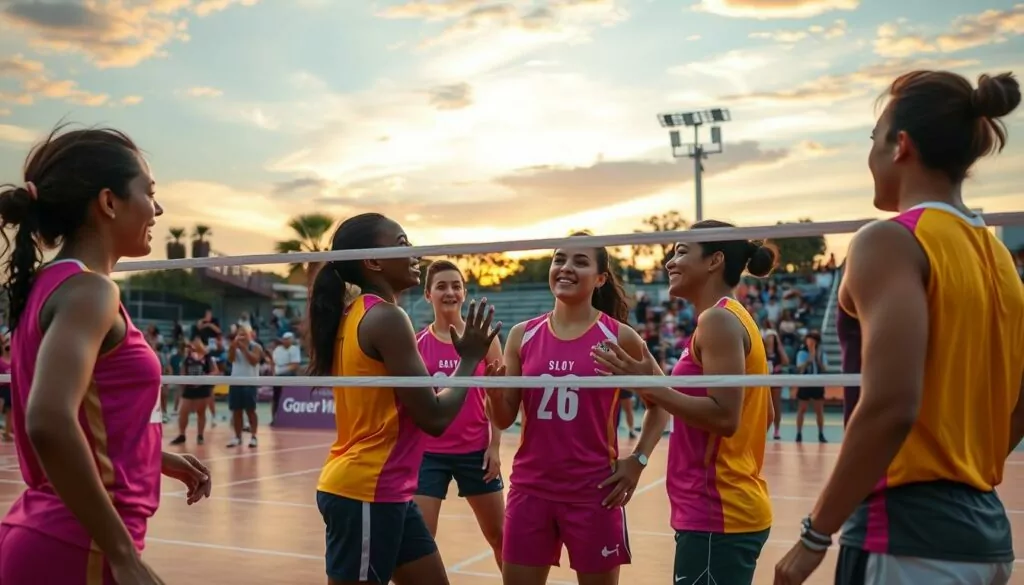
Good communication is key for successful volleyball teams. We must speak clearly and respectfully to our teammates, opponents, and officials. Our words help create a positive environment, based on understanding and respect.
Verbal Communication with Teammates
Clear talk is vital during games. We should call out plays and give encouragement. Our positive words help avoid confusion and unite our team.
Non-verbal Communication Beyond Words
Actions and gestures also show our respect for the game and opponents. A simple hand up for a fallen player or a clap for a great play matters. These actions promote fair play and friendship.
Research shows 85% of players show good sportsmanship by cheering for their opponents. And 95% shake hands or high-five after matches. These actions highlight the value of respect and positive communication in volleyball.
Being aware of our words and actions sets a good example. It helps create a respectful atmosphere on the court. Following volleyball’s sportsmanship guidelines is important for us all.
Dealing with Mistakes
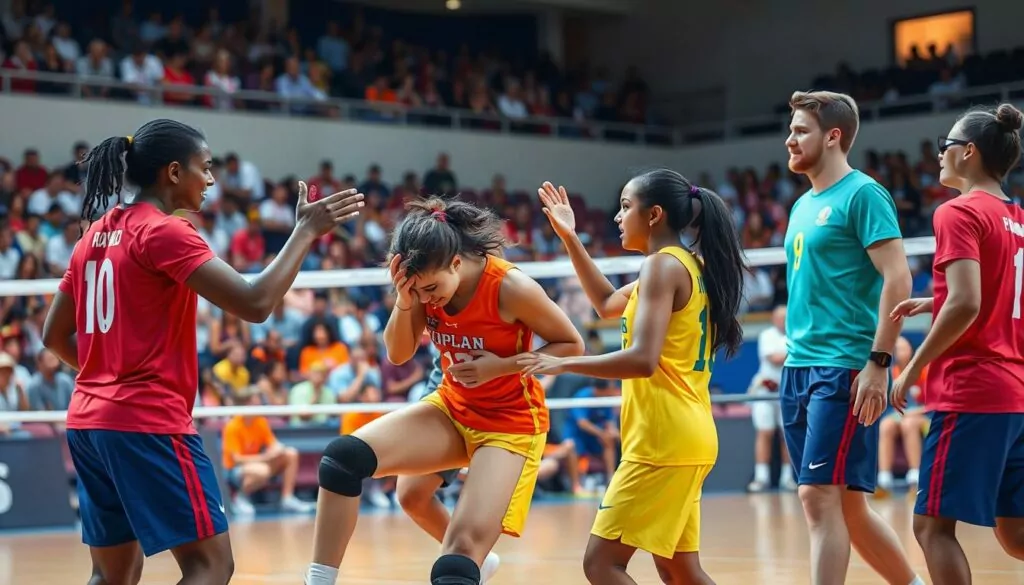
As volleyball players, we all know mistakes are part of the game. The true test of our sportsmanship is how we handle these moments. Self-control and a positive attitude are key to following volleyball sportsmanship guidelines.
Accepting Personal Errors
When we make a personal error, it’s important to take responsibility. Avoid blaming teammates or making excuses. Instead, focus on learning from the mistake and moving forward with renewed determination.
A mature player acknowledges their errors, learns from them, and uses that experience to improve their game.
Handling Team Mistakes Gracefully
Team mistakes can be tough to navigate, but they offer a chance to show true sportsmanship. When a teammate makes an error, resist the urge to criticize or show frustration. Instead, offer encouragement and support.
Maintaining a positive and understanding attitude helps keep team morale high. It fosters an environment of trust and camaraderie.
“The true measure of a champion is how they act when they lose, not when they win.”
By embracing mistakes as learning opportunities and supporting each other, we improve our performance. We also set a positive example for volleyball. Sportsmanship is about more than just winning; it’s about how we carry ourselves, on and off the court.
The Role of Officials
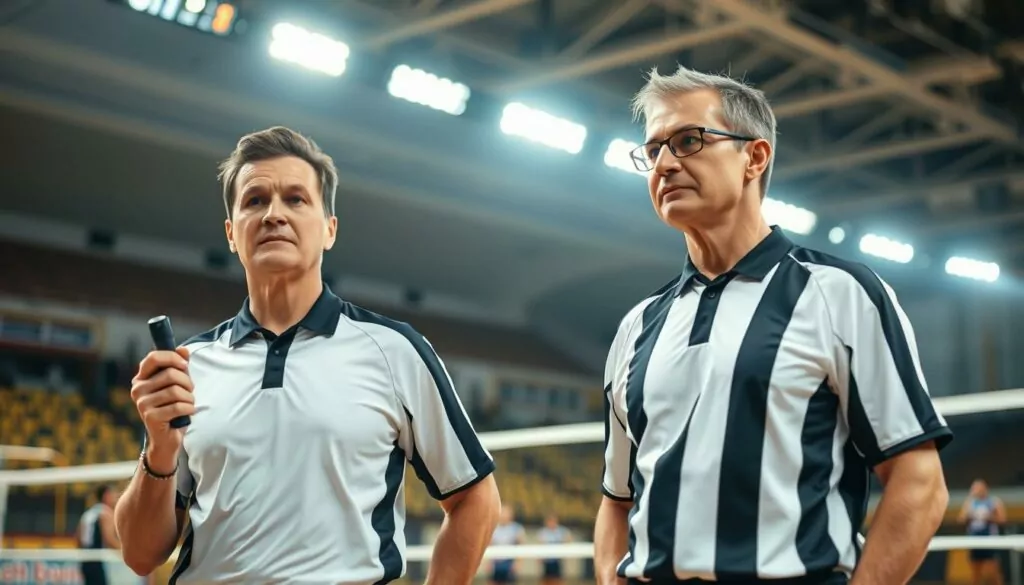
In volleyball, respecting officials and their calls is key. Players must remember that referees enforce the rules and keep the game fair. Even when we don’t agree with a call, staying calm and respectful is important.
Respecting Referees and Their Decisions
Arguing with officials can harm a player and their team. Referees aim to make fair decisions. Accepting their calls shows we value fair play and the game’s spirit.
How to Approach Disputed Calls
- If a call is questioned, players should talk to their captain or coach first.
- Directly confronting officials is not wise, as it can lead to penalties.
- Team captains should politely discuss the call with referees, providing any needed details.
- Officials are trained to handle these talks and make fair decisions based on the rules.
Accepting officials’ decisions, even when they’re not in our favor, is vital. This shows respect for the game and ensures a positive experience for everyone.
| Statistic | Details |
|---|---|
| 27 years of officiating | Encountering equipment stored in play areas has been a common issue, often requiring officials to request removal. |
| Various state procedures | Officials address equipment storage issues through special reports, local board meetings, and written correspondence. |
| Discussions at meetings | Local officiating boards discussing safety at meetings and taking pro-active steps to eliminate safety issues at each school has proven beneficial for both new and experienced officials. |
“Officials are the central authority in maintaining proper sportsmanship during athletic events. Referees, umpires, and judges are urged to demand the highest level of sportsmanlike conduct from players and coaches, necessitating officials to model exemplary sportsmanship.”
Maintaining Composure
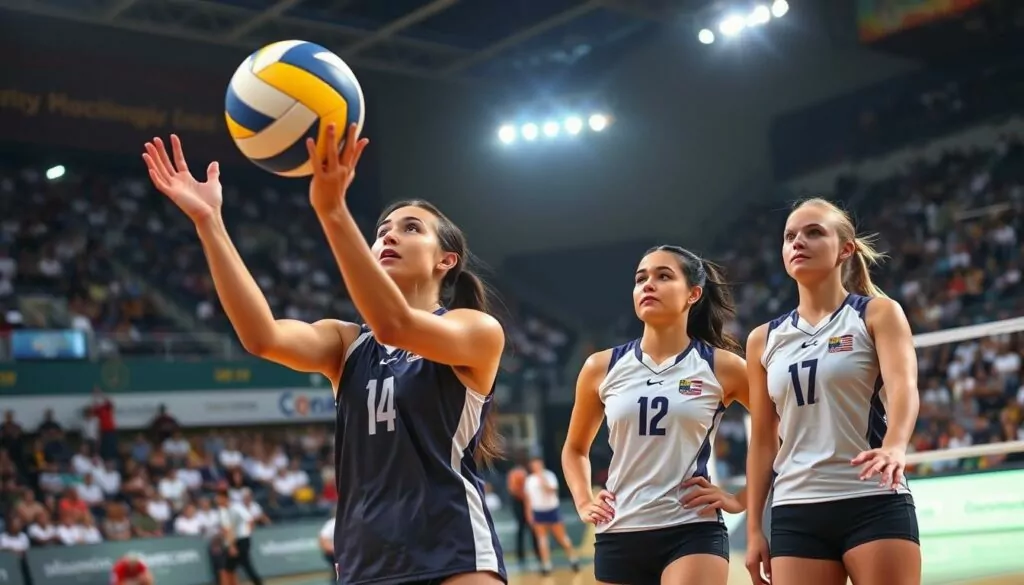
In volleyball, staying calm is key. It helps you perform better and work well with your team. Learning to manage your emotions can make a big difference.
Staying Calm Under Pressure
Volleyball games are intense, with lots of emotions. It’s important to find ways to stay calm. Deep breathing exercises can help you focus and regain control.
By taking a few deep breaths, you can reset your mindset. This lets you approach the game with a positive attitude.
Strategies for Managing Emotions
Mistakes, disputed calls, and rivalries can upset players. But, staying calm and acting with sportsmanship is vital. Positive self-talk can help you stay focused and avoid bad behavior.
It’s also important to acknowledge and process emotions in a healthy way. By recognizing and accepting your feelings, you can use them positively. This ensures your actions on the court are controlled and respectful.
Working on composure is a continuous journey. But, the rewards are worth it. By staying calm and managing your emotions, you improve your game. You also help create a positive team atmosphere and promote respect and sportsmanship.
Inclusivity in Volleyball

Volleyball is all about good sportsmanship and a positive attitude. It’s important to welcome everyone on the court, no matter their skill level. This way, we can all support each other.
Embracing Diversity on the Court
Volleyball is for people from all backgrounds. It doesn’t matter if you’re young or old, male or female. The court is where we learn from each other and celebrate our differences.
By welcoming everyone, we make the game more fun for everyone. It’s a place where we can all work together and succeed.
Supporting Each Other Regardless of Skill Level
In volleyball, everyone has different skills. But what’s most important is how we support each other. Helping those who are new to the game not only improves their skills but also builds a strong team spirit.
Being inclusive in volleyball means more than just playing fairly. It’s about creating a positive space where everyone can do their best. By following the good sportsmanship and positive attitude guidelines, we make sure volleyball is a game that brings out the best in everyone.
“Volleyball is a game that brings people together, and it’s our responsibility as players to make sure that everyone feels welcome and included on the court.”
Good sportsmanship and a positive attitude are key to inclusivity in volleyball. By embracing diversity and supporting each other, we make the game more than just winning. It becomes a joyous experience where we build lasting connections.
Encouraging Healthy Competition
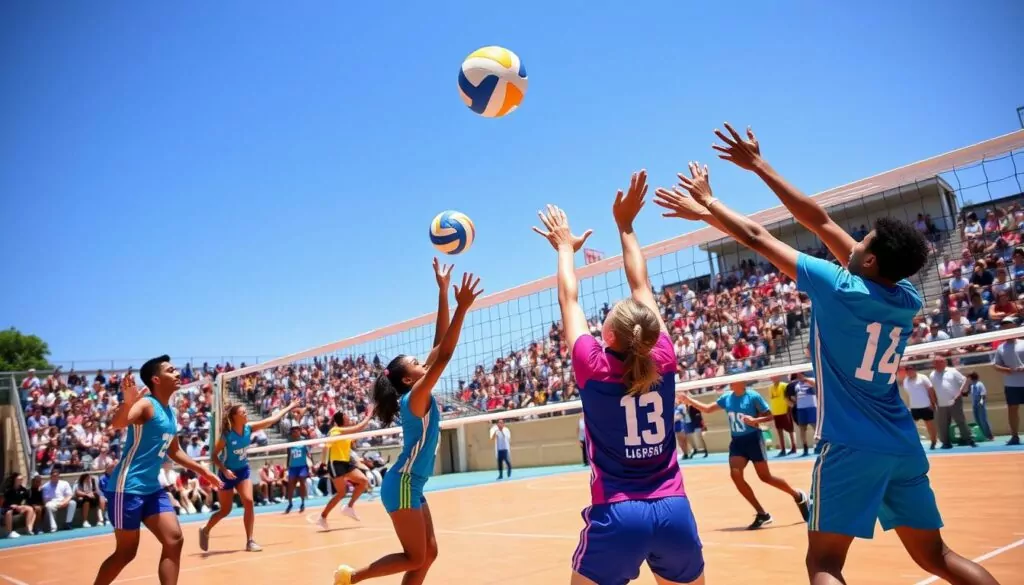
In volleyball, it’s not just about winning. It’s about striving for excellence with a positive attitude and fair play. Players should aim for personal and team growth, not just winning. This mindset helps us show good sportsmanship, benefiting us and our teammates.
Striving for Excellence
Excellence in volleyball means more than just scoring points. It’s about getting better, physically and mentally. We should always look to improve our skills and set goals. Doing this with respect for our opponents is key.
Learning from Both Wins and Losses
We’ll win and lose in volleyball. Instead of letting losses get us down, we should see them as chances to learn. By learning from our mistakes and staying positive, we grow. This is what good sportsmanship is all about.
Healthy competition in volleyball is about finding a balance. Strive for excellence, learn from every game, and stay positive. This creates a fair, respectful, and supportive environment. It helps us grow as individuals and as a team, making volleyball better for everyone.
“Sportsmanship is not just about winning and losing, it’s about how you play the game.” – Billie Jean King
Building Team Spirit
It’s key to have a positive attitude and good sportsmanship in volleyball. Team-bonding activities and recognizing each player’s role help create a united team. This makes the team stronger and more supportive, following the volleyball sportsmanship guidelines.
Activities that Foster Team Cohesion
Doing things together, like going on outings or eating meals as a team, builds unity. These activities help players talk openly, trust each other, and get to know each other better. This leads to a better positive attitude and good sportsmanship during games.
Recognizing Individual Contributions
- Valuing each player’s efforts creates a supportive team atmosphere. It shows that everyone’s success is important.
- Coaches should praise players for their achievements, like great performances or showing sportsmanship.
- When we praise players, it makes them feel good. It also encourages others to act positively, making the team stronger.
| Team-Building Activities | Benefits |
|---|---|
| Group Outings | Fostering camaraderie and personal connections |
| Shared Meals | Encouraging open communication and trust |
| Team-Focused Workshops | Improving collaboration and problem-solving skills |
“Building trust within a team is essential for various aspects, including the team’s trust in the coach, the coach’s trust in the team, and the players’ trust in one another. Coaches play a key role in building this trust through clear communication, team-building activities, and recognizing individual contributions.” – Jennifer Nalepa, Assistant Professor of Kinesiology
Handling Conflict
Conflict is a natural part of any team dynamic, and the volleyball court is no exception. With the right strategies and an open dialogue, players can address disagreements constructively. This upholds the principles of good sportsmanship.
Conflict Resolution Strategies
Effective conflict resolution starts with understanding that conflicts can help teams grow and take risks. Encouraging team members to voice concerns and issues helps find solutions that benefit everyone. Setting clear standards and rules from the start can also reduce conflicts.
It’s important to address any signs of bullying or disrespectful behavior, like eye-rolling, right away. Technology can sometimes hinder conflict resolution due to missing non-verbal cues. Reading emails aloud and using emojis can help convey tone and prevent misinterpretation.
The Importance of Open Dialogue
Understanding the positions and interests of all parties involved is key to finding effective solutions. Coaches should establish solid conflict resolution systems early in the season. Regular team meetings can help address problems and prevent conflicts from escalating.
Paying attention to non-verbal cues of excluded or disengaged team members can help identify and address underlying issues. By fostering an environment of open dialogue and mutual respect, players can navigate conflicts with self-control and positive communication. This upholds the volleyball sportsmanship guidelines that define the spirit of the game.
Long-Term Benefits of Sportsmanship
Playing volleyball teaches us important lessons that last a lifetime. By following volleyball sportsmanship guidelines, we learn valuable skills. These skills help us in many areas of life, not just on the court.
Lifelong Lessons from Volleyball
Volleyball teaches us to respect others, be honest, and work together. These values shape who we are and how we interact with others. It helps us deal with both good and bad times with grace and strength.
Personal Growth Through Sportsmanship
Good sportsmanship in volleyball helps us grow as people. It boosts our self-confidence, encourages teamwork, teaches us to keep going, and brings us together. These skills are important in many areas of life, like working well with others and solving problems.
“Sportsmanship is the foundation upon which the entire structure of athletic competition is built. Without it, the game is nothing more than a bare contest of brute force.” – Knute Rockne
By following ethical behavior and good sportsmanship in volleyball, we learn to be good people. These lessons shape our character, help us grow, and make us positive examples for others.
Implementing Sportsmanship in Practice
As a volleyball coach, I think it’s key to talk about sportsmanship and put it into practice. We create a team sportsmanship code and design drills to teach ethics. This helps our players become respectful and responsible athletes, both on and off the court.
Creating a Sportsmanship Code for Your Team
We start by making a clear sportsmanship code for our team. I involve the players in this, asking for their ideas. We all work together to list the behaviors and attitudes we expect, like respecting opponents and playing fair.
After we have our code, we post it in our gym. We also talk about it in team meetings and huddles. This makes sure everyone knows and follows the sportsmanship rules.
Incorporating Sportsmanship into Drills
We also add sportsmanship activities to our practice. This includes drills on communication, solving conflicts, and handling mistakes well. By doing this, we strengthen these important skills and build a culture of ethics.
For example, in a serving drill, players are encouraged to support their teammates after each try. In passing drills, they learn to give helpful feedback in a kind way. These small changes help our players support each other better.
By focusing on volleyball rules, good sportsmanship, and ethical behavior in practice, our team grows. They become better athletes and represent the best of our sport.
“Sportsmanship is the foundation of any successful sports program. It’s not just about winning; it’s about how we treat each other, win or lose.”
Conclusion: My Commitment to Sportsmanship
Thinking about volleyball sportsmanship makes me realize its big impact. It’s not just about following rules or staying positive. It’s about showing respect, playing fairly, and caring for everyone involved.
Embracing the Spirit of the Game
Being committed to sportsmanship means living by the game’s values. It’s about congratulating opponents, accepting defeats, and supporting teammates. I aim to show the importance of fair play, integrity, and respect in volleyball.
Being a Role Model for Future Players
As a player, I can shape the next volleyball stars. By being a good example, I encourage young athletes to play with the same values. This goes beyond just playing well. It’s about teaching them life skills through sportsmanship.
